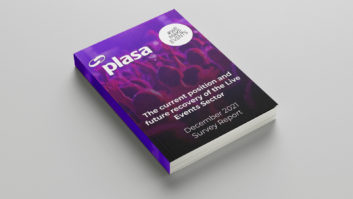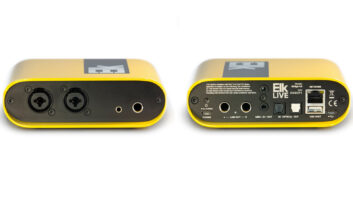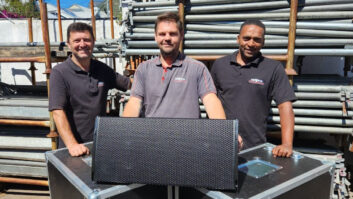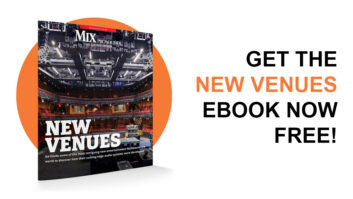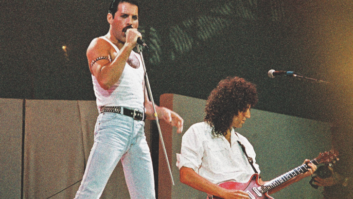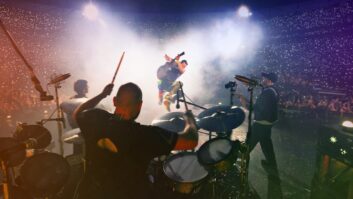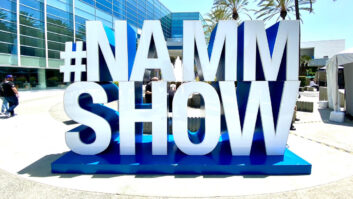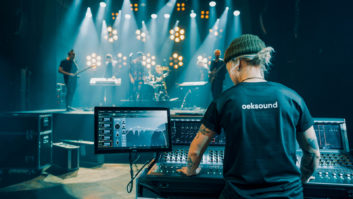
Leipzig, Germany (August 26, 2020)—A team in Germany recently held three concerts in a single day to investigate how large-scale entertainment events might resume safely before a COVID-19 vaccine becomes available.
The study, dubbed Restart-19, took place Aug. 22 at Quarterback Immobilien Arena in Leipzig, Germany, and featured three concerts by popular German singer Tim Bendzko and his band. A team of researchers from the city’s Halle University led by Dr. Stefan Moritz, head of the clinical infectious diseases department, planned the event to study three different scenarios: a pre-pandemic concert with no safety measures, an event with some social distancing and a hygiene regimen, and a reduced crowd with concertgoers positioned about six feet apart.
The 1,400 audience members (the organizers had hoped for 4,000 volunteers) were all tested for COVID-19 before the event. On the day, attendees, who ranged in age from 18 to 50, according to the BBC, had their temperatures taken on arrival, were given face masks and were provided with tracking devices to measure their social distancing. In addition, fluorescent disinfectants were applied to their hands so that the team could study which surfaces concertgoers touched the most.
As Moritz told the New York Times, “We know the personal contacts at the concert are risky, but we don’t know where they happen. Is it at the entrance? Is it at the bleachers?”
The Halle University team hopes to use the data gleaned from the event to create guidelines for governmental agencies to limit the spread of the disease and allow entertainment venues—as well as the artists and the service industries that support them—to safely restart. The university team will feed their collected data into a mathematical model that should help scientists evaluate the risks associated with the spread of the virus at large indoor events. In an interview with German broadcaster Deutsche Welle, Michael Gekle, dean of Halle University’s medical faculty, commented, “It’s all about taking an evidence-based approach.”
Live Sound Turns to Congress for Help, by Clive Young, Aug. 25, 2020

There is little doubt that the entertainment industry as a whole is hurting, as sound, lighting, video, staging and other service companies sit idle pending a return to live events. In an interview on CNBC on Aug. 24, Michael Strickland, chair and founder of Bandit Lites, whose clients include Iron Maiden, ELO, sports leagues and broadcasters, noted that 10 to 12 million are employed in the business. “Everyone below the artist level is struggling right now,” he said.
In Saxony, the German state where Leipzig is located, indoor events are currently restricted to 1,000 attendees, with strict rules in place to guard against spread of the virus. It has been reported that the Halle University study came just as Germany was experiencing the highest number of COVID-19 infections since the end of April, however.
Even with safety guidelines in place, restarting the entertainment industry will not be that easy as there are still economic issues to overcome. Imposing distancing measures reduces the potential audience size in any venue. As Philipp Franke, a manager at the Quarterback Immobilien Arena, told the New York Times, Saxony’s current audience limit is too low to make shows financially viable at the venue. The state had reportedly planned to raise the limit in September but is reconsidering in the face of resurging coronavirus infections.
Related:
• Pro Audio Manufacturers Ready for the Rebound, by Clive Young
• Sound for a Socially Distanced Ravenna Festival
• Concert Livestreams Evolve Quickly During COVID-19, by Clive Young
• Reopening Live Music Right, Right Now, by Clive Young
• Germany Holds Experimental COVID Concert in Leipzig, by Cynthia Wisehart, Sound & Video Contractor
About two weeks before the Leipzig show, England held what is said to be the country’s first socially distanced arena show when Brits Critics’ Award-winner Sam Fender played to a crowd of 2,500 at Virgin Money Unity Arena. The pop-up venue, intended as a dedicated solution in the face of the coronavirus, is in Newcastle’s Gosforth Park, a former horse racecourse, which typically holds about 20,000 people. Groups of up to five fans each occupied 500 raised platforms at the inaugural show, which complied with the UK government’s coronavirus guidelines, including six-foot spacing between parked cars.
Future shows currently scheduled at the venue include Van Morrison, Maximo Park and Craig Charles. Carl Barât, co-frontman of the Libertines, who are set to play two shows at the end of August, told Rolling Stone, “Like everybody, we didn’t really understand how it could work at first, but if this is the first thing we can legally do, then, yeah, sign us up.”
Quarterback Immobilien Arena • www.quarterback-immobilien-arena.de/en/home/
Virgin Money Unity Arena • virginmoneyunityarena.com/
